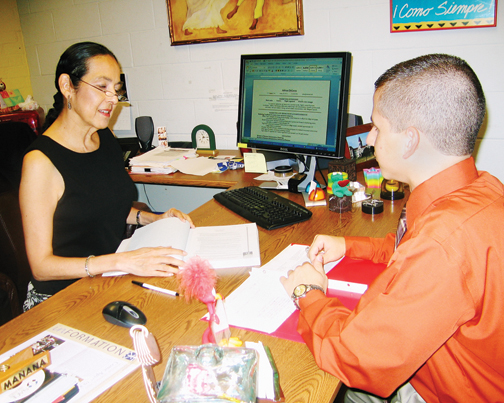St. Edward’s graduates struggle

Emily Salazar, career counselor, with Adrian DeLeon, a junior.
Having a degree from St. Edward’s University may no longer guarantee that the class of 2009 gets a job.
Students spend thousands of dollars in order to graduate and advance to a career or graduate school. But recently- graduated students are having trouble finding jobs in the overwhelmingly competitive job market, said Elizabeth Garcia Nichols, who works in the Office of Career Planning.
Only 70 percent of August graduates have jobs, based on a survey of students by Career Planning.
Nichols said these students might not have a job in a field related to their degree or in a professional field.
“They could be working at a place they have worked at all through college,” she said. The same survey reported 23 percent of August graduates were looking for work, while 7 percent planned to attend graduate school.
Beaula Roop, a former student, thought she had landed a full-time job after completing a two-semester social work internship.
The Austin Travis County Mental Health and Mental Retardation Center, where she interned, hired her part-time in May intending to promote her to full-time work upon her graduation in August. The economy, however, prevented this.
Now Roop is without the benefits she would have if employed full-time.
“I’ve been looking for a job that is full-time,” Roop said. “But there is nothing out there.”
Nichols said students could search for a job for four to six months after they graduate before finding one.
Mallory Roberts, who graduated last May with a degree in finance, found herself in that situation.
“It has been difficult,” Roberts said. “The finance industry is not exactly thriving.”
She has applied to bank jobs ever since she graduated. Last Friday, she found a job as a practice strategy specialist in the healthcare industry after five months of searching.
Elyse Longoria, a senior communication major, will graduate this December, and her only work experience has been as a nanny and babysitter.
“I’m really excited, but it is scary because of the economy,” she said.
Longoria is not sure what she is going to do once she graduates.
“If someone is going to pay me to do something, I’m going to do it,” Longoria said.
Getting a job depends on a student’s degree and field of interest, Nichols said.
Professional and service jobs have decreased, while the education, accounting, healthcase, government and sales industries are still hiring.
“We really encourage our students to look at jobs in the Federal government because they have been steady to increasingly hiring,” said Nichols.
The Federal government has been actively attempting to create new jobs within the public sector in an effort to counteract the lagging economy. Since the $787 billion American
Recovery and Reinvestment Act was passed, 25,000 jobs have been added to the Federal government.
Nichols also recommended students look for employment with small- to medium-sized businesses because they are experiencing the most growth.
Graduate, new college, and undergraduate students are all competing with each other for jobs now according to Nichols.
“Sometimes graduate students and new college students who have more experience are having to take jobs that are several levels down from where they should be looking at,” said Nichols.
Nichols said she has seen an increase in the number of students going to graduate school.
“I’m realizing that graduate school may be my only option,” said Jessica Cibik, who graduated last May, and has applied for 47 jobs before she stopped counting, including nine jobs this week.
And, Nichols said, the competitive job market is not limited to the class of 2009.
“Overall hiring for the class of 2010 is expected to decrease by 7 percent,” she said.
Despite this, Jonlee Martinez, a senior, is not worried about getting a job as a police officer after he graduates next spring because the turnover rates for cities are so high.
“I am really confident that I will be hired,” Martinez said. “Maybe I am underestimating the competitiveness of the job market.”
Career Planning will be holding a resume writing workshop on Sept. 30. Nichols said that students should start their job search at least six months before they graduate.
“Apply for everything,” Roberts said. “The worst they can do is tell you that someone more qualified got the job.”






